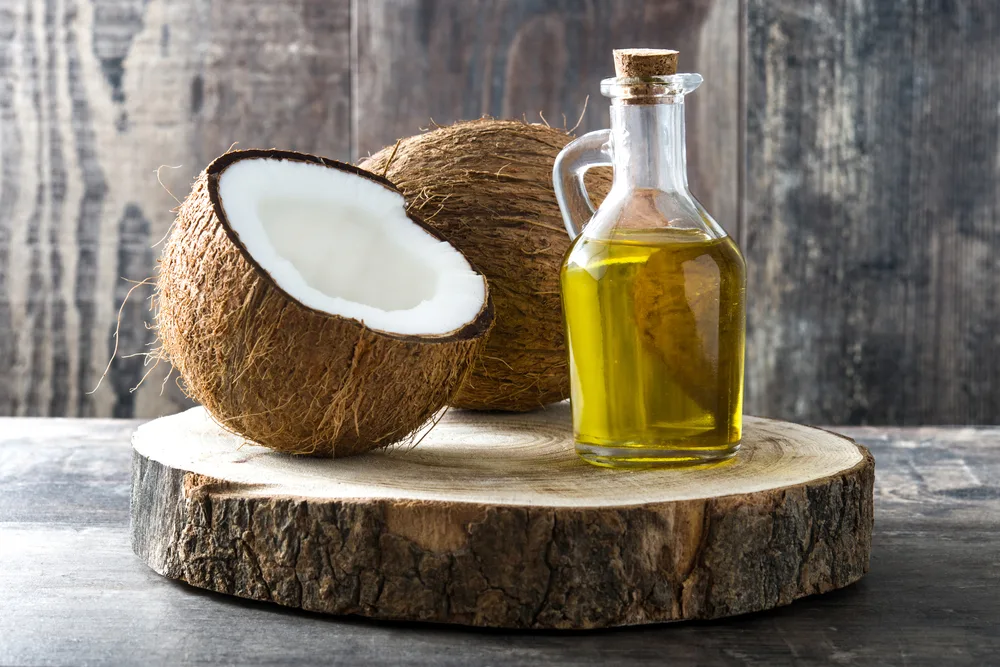Jump to:
Coconut oil is a staple in many people’s cupboards and makes for a variety of delicious dishes — but did you know that coconut oil also boasts tons of benefits for your hair? Let’s take a look at the benefits of refined vs. unrefined coconut oil for hair.
What Is Coconut Oil?
Coconut oil is from the copra (dried meat section of the coconut) and contains about 52% saturated fats, including capric, caprylic, and lauric acids. But when talking about refined vs. unrefined coconut oil for hair, you should know that are the differences.
The short answer is this: the better choice for your hair is unrefined coconut oil. We’ll explain why in a bit. First, you should know why it’s used.
Because of the moisturizing properties when rubbed on the skin, many people use coconut oil not only on hair, but also to treat eczema, among other things.
Other health benefits from coconut oil include:
- Controlling blood sugar
- Increasing good cholesterol
- Reducing stress
- Shiny hair
- Preventing liver diseases
- Reducing asthma symptoms
- Dental health
- Aiding in satiety
- Weight loss
There are two kinds of coconut oil: refined and unrefined. The biggest difference between the two is the production methods. Let’s dig a little deeper into each.
Production of Refined Coconut Oil

Vovidzha/Shutterstock
The refining process of coconut oil makes the oil easier to cook with. The first part of the process includes pressing the copra to get the coconut oil; similar to how you procure unrefined coconut oil.
The next step(s) may or may not happen, depending on who produces the coconut oil.
- Degumming: a mixture of degumming chemicals and coconut oil washed with water removes the gums that may change the oil’s texture.
- Neutralizing: this process results in a fatty acid soap from the addition of sodium lye to the oil.
- Bleaching: a clay filter processes the oil to “bleach” it; this process uses no actual bleach.
- Deodorizing: this includes a heat-deodorizing process of the oil to mitigate any residual coconut taste or scent.
Though coconut oil undergoes more processing than unrefined, the smoke point is higher at 450° Fahrenheit (204–232° Celsius).
You Might Also Like:
- Does Coconut Oil Remove Hair Dye?
- Should You Use Coconut Oil Before Bleaching Your Hair?
- Is Coconut Oil Good for Your Hair?
- Is Coconut Oil Good for Low-Porosity Hair?
Production of Unrefined Coconut Oil
You get unrefined coconut oil, also called virgin coconut oil, by pressing coconut meat that has undergone no other processing. There are two options to extract unrefined coconut oil: a wet and a dry method.
The wet method involves pressing both coconut oil and coconut milk out of the coconut flesh and separating the two. The dry method is when a machine presses coconut oil out of dried coconut flesh, or copra, similar to the extraction process of refined coconut oil.
The typical procurement process for unrefined coconut oil happens via the wet process. The price tag is much higher on unrefined coconut oil because of its substantially higher nutritional value than refined.
Refined vs. Unrefined Coconut Oil for Hair: Which to Use?
Now that we’ve established the procurement methods for each type of coconut oil, which one can you use on your hair?
While both refined and unrefined coconut oil offers nutritional value, unrefined is the slightly better choice. It doesn’t contain any additives, has more nutritional density, and preserves the natural enzymes lost during processing.
How to Use Coconut Oil on Your Hair

Mr. Cheangchai Noojuntuk/Shutterstock
You can reap several benefits from using coconut on your hair, including UV and breakage protection, encouraging growth, detangling purposes, reducing hair loss, and treating issues like dandruff and lice.
Protection
Styling your hair daily causes wear and tear that can leave your flowing mane brittle and prone to breakage. Using heated tools or chemical treatments opens the cuticle, preventing it from protecting the cortex.
Coconut oil absorbs deeply into the hair shaft to help repair the cuticle and cortex. Regularly using coconut oil in your hair routine reduces protein loss of the cortex to keep your hair strong and healthy.
Detangling
Detangling your hair, especially curly hair, can be a tough and painful process. And if it’s done roughly, it can also lead to breakage. Applying coconut oil to your hair makes your strands slick and less likely to tangle and knot with other strands.
Here’s a quick guide on how to use it:
- After washing and conditioning your hair, apply a generous amount of coconut oil to your damp hair. You can also purchase a coconut oil-based detangler.
- Use your fingers to detangle the most stubborn knots.
- Using a wide-toothed comb, gently detangle the rest of your hair. Use caution not to rip or snap any of your strands. If you hear any concerning noises, revert to finger detangling.
Reducing Breakage/Hair Loss
Your hair goes through a lot! Anything from heat styling to chemical treatments to over-washing to pollution can result in hair loss. You can add coconut oil to your hair routine to preserve protein in the cortex and hair shaft and mitigate damage/breakage.
Treating Dandruff
If your scalp is in dire need of some TLC, applying coconut oil directly to your scalp and combing it through is a good start. Leave the oil on for a few minutes so it has a chance to penetrate your hair and skin deeply for hydration. For a more lathering product, you can mix coconut oil with warm water and then apply it.
Treating Lice
Onto a more serious issue, coconut oil can help with lice. When coconut oil and aniseed oil mix, the result is an extremely effective treatment for lice.
Frequently Asked Questions

etorres/Shutterstock
Choosing the right products for your hair is an important task, and even better when they’re natural! If you still have questions about refined vs. unrefined coconut oil for hair, check out some of the most commonly asked below.
Should you use refined or unrefined coconut oil on your hair?
Unrefined oil is best for your hair since it’s more nutritionally dense and retains the natural enzymes lost in processing methods.
Does coconut oil help with hair growth?
Yes. The fatty acids and vitamins in coconut oil penetrate and nourish your scalp and hair cuticles, resulting in stronger, healthier hair and encouraging growth.
Which is healthier: refined or unrefined coconut oil?
Whether you should use refined or unrefined coconut oil comes down to preference. Both oils provide the same nutritional value, with unrefined being a little more nutritionally dense due to the procurement process.
Can you use unrefined coconut oil on your skin?
Yes. In the same way that unrefined coconut oil works to nourish your scalp, it penetrates the skin deeply as an excellent moisturizer.
What are some other uses for coconut oil?
Besides hair and cooking, you can use coconut oil for a variety of things. It can help increase your metabolism, improve dental health and brain function, boost bone health, and more.
So, Refined vs. Unrefined Coconut Oil for Hair?
Long story short, unrefined coconut oil is the way to go if you wish to add it to your hair routine. Using it as a hot oil treatment for dry, brittle hair, as protection from the sun, or to treat more serious issues like dandruff or lice is a way to ensure you’re not adding a ton of unnecessary chemicals to your hair.
Whatever you decide to do with coconut oil, hopefully, you’re confident in its abilities to help you on your hair journey! And while you’re here, be sure to check out our other hair care and styling guides. Trust us — your hair will thank you.
